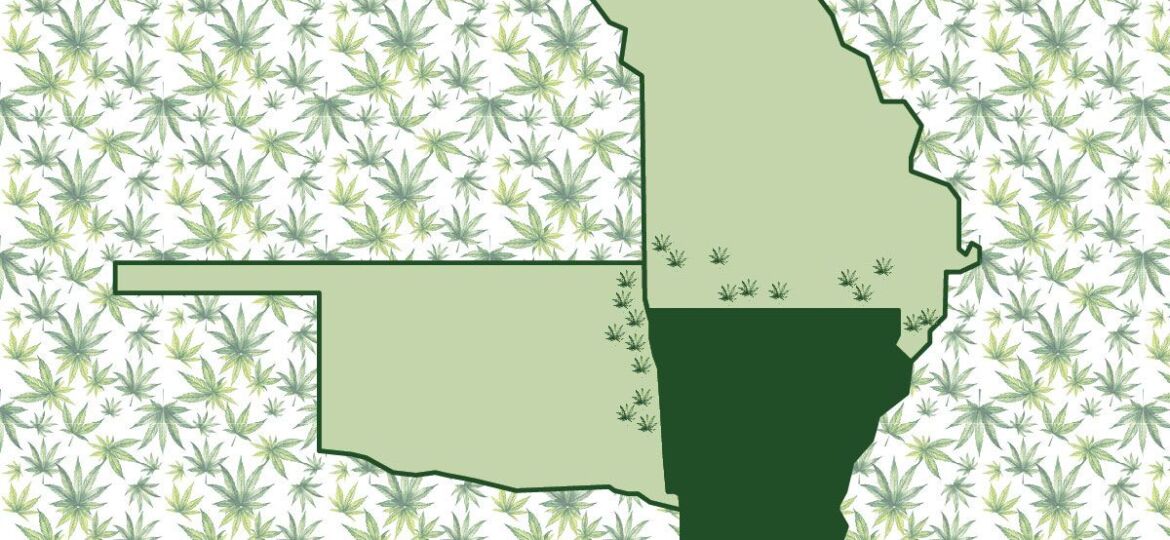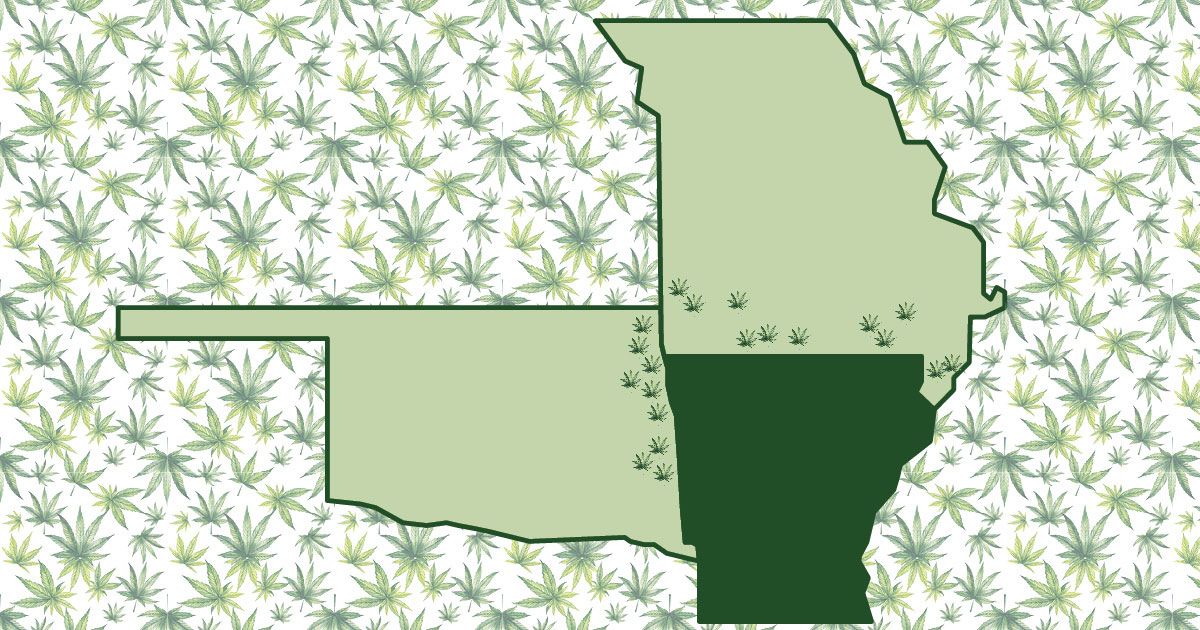

When Missouri voters legalized recreational marijuana in November (and Arkansas voters rejected a similar measure), it was only a matter of time until the results began to impact dispensaries in North Arkansas.
An executive with one dispensary near the border said he has noticed a decrease in business and thinks it could be related to changes across the border. “We have seen a downward trend in terms of just our overall sales, our overall foot traffic,” said Matt Shansky, chief operating officer at the ReLeaf Center Dispensary and Farm in Bentonville.
Advertisement
Shansky said he attributed a portion of the decrease to Missouri’s legalization of recreational marijuana — not just because Arkansas consumers are crossing the border for Show-Me State weed, but also because Missouri consumers are trying the recreational dispensaries at home rather than using visitor patient cards to shop in Arkansas.
In February, Missouri saw its first legal recreational cannabis sales and today boasts 213 dispensaries and 67 cultivators, according to the latest data from the state. Nearly all of the facilities are approved to serve both medical and recreational consumers.
Advertisement
The first month of recreational sales in Missouri was enormous. The state reported $102.9 million in overall marijuana sales with $71.7 million coming from recreational sales and another $31.2 million coming from medical sales in February. In the same month last year, the state reported $26.66 million in medical sales, according to Lisa Cox, communications director for the Missouri Department of Health and Senior Services.
Thanks to lots of favorable votes in the St. Louis and Kansas City areas, Missouri passed recreational marijuana by a vote of 53.1% to 46.9%. The ballot measure included provisions for forgiving some past marijuana-related offenses and for home-grown cannabis.
Advertisement
An Arkansas measure that would have legalized recreational marijuana for adults failed by a vote of 56.25% to 43.75%. The measure would have legalized new, small cultivators and increased the number of dispensaries but it did not include provisions related to past convictions, did not allow for home grows and was criticized for being too favorable to the existing marijuana industry.
A legal recreational marijuana program in a neighboring state, especially one that raked in more than $100 million in its first month, is bound to have an impact on Arkansas, but it might be too soon to tell exactly how much.
Bill Paschall, executive director of the Arkansas Cannabis Industry Association, said the magnitude of the impact is “to be determined.” Paschall said he has spoken with dispensaries in northern Arkansas and said they have been “holding their own,” crediting their success to lower prices in Arkansas compared to the prices in the early stages of Missouri’s recreational program. As the Missouri market matures, though, prices could fall there, which could result in more impact on Arkansas dispensaries, he said.
“It’s too early to really know,” he said.
Advertisement
We reviewed the sales numbers from Arkansas dispensaries near the border, comparing the sales of February through mid-March with the same period last year. Sales were mostly even, although there were notable dips at the ReLeaf Center in Bentonville and NEA Full Spectrum in Brookland, near the Missouri bootheel.
Pounds sold at the ReLeaf Center fell from 464 to 370 and at NEA Full Spectrum from 220 to 162. Pounds were also down slightly among Fayetteville dispensaries over the same period.
Oklahoma
Out-of-state cannabis competition in Northwest Arkansas is not new. Neighboring Oklahoma’s medical marijuana program has been a frequent talking point in Arkansas cannabis circles for a while. The Oklahoma program takes a less-regulated approach to medical marijuana that insiders regularly refer to as the “Wild West” and say it’s practically a recreational market rather than a medical one.
Take the number of dispensaries and cultivators, for instance. Arkansas’s constitution limits the state to eight cultivators and 40 dispensaries. Oklahoma, on the other hand, has 2,884 dispensaries and 6,872 growers. (That’s not a typo.)
Oklahoma does not limit the number of cultivators or dispensaries, although its state legislature passed a bill placing a moratorium on the issuance of new licenses.
“Within the United States, I really don’t think you could have two programs that differ any more than Oklahoma’s and Arkansas’s,” said Scott Hardin, spokesman for the state Medical Marijuana Commission. “Arkansas’s is arguably as strictly regulated a medical marijuana program as there is in the country.”
The differences are also clear on the patient side. Oklahoma does not have qualifying conditions for medical marijuana, instead allowing doctors to certify for the program any resident they feel would benefit from marijuana. Arkansas, by contrast, requires applicants to have at least one of 17 qualifying conditions, such as cancer, post-traumatic stress disorder or intractable pain.
Oklahoma’s model brought more access to consumers, lower prices early on, more product variety and, according to some, less certainty about the products.
David Lawson of The Source dispensary in Rogers said he hasn’t noticed an impact from Missouri yet, but said Oklahoma has “felt like a factor for some time.” Lawson said he’s noticed the sales of some product categories, particularly concentrates, are not in line with other sales and believes it might be from Arkansas patients shopping in Oklahoma dispensaries.
Lawson said he’s visited dispensaries in Oklahoma and said it was hard to determine which products were of high quality because there are so many products in that market.
“I feel a little better about coming to the shelf in Arkansas knowing we have a dependable, clean, safe product for patients,” Lawson said. Arkansas patients are beginning to appreciate what Arkansas’s regulatory structure provides to the consumer, though, Shansky said. In the early phases after Oklahoma’s legalization of medical marijuana, consumers “just saw cheaper stuff and more options and that was all that really mattered in those early phases,” Shansky said. “Over time, I think people have realized, it does matter. The quality standards are a big factor.”
In March, Oklahoma voters rejected a ballot measure that would have legalized recreational marijuana 61.7% to 38.3%.
Other states
Mississippi and Louisiana have small, fairly new medical marijuana markets. Mississippi voters legalized medical marijuana at the polls in 2020 but the results were thrown out by the state Supreme Court due to some outdated language regarding ballot petitions. The Mississippi legislature approved a medical marijuana bill last year and the first sale took place earlier this year but the program is off to a slow start.
Mississippi has issued “very few” patient cards, according to Paschall of the Arkansas Cannabis Industry Association. One industry source said Mississippi has more people waiting to get approved for patient cards than they have cardholders.
Paschall said Mississippi requires patients to obtain authorization from two doctors in order to be approved for the program, making it more difficult for patients to get a card.
“I don’t anticipate Mississippi is going to be much of a competitor for the near future,” Paschall said.
Louisiana’s medical marijuana began in 2020 with restrictions that did not allow sales of cannabis flower, but has since allowed flower and other products to be sold. The state requires the products to be sold in pharmacies and there are only 10 approved pharmacies.
Paschall described the Louisiana program as a full-fledged medical marijuana program similar to Arkansas’s but with less access.
Texas has a medical marijuana program that is extremely limited, allowing only patients with a very limited number of conditions to access marijuana with 1% THC content.
Tennessee has not legalized marijuana for medical or recreational use.

